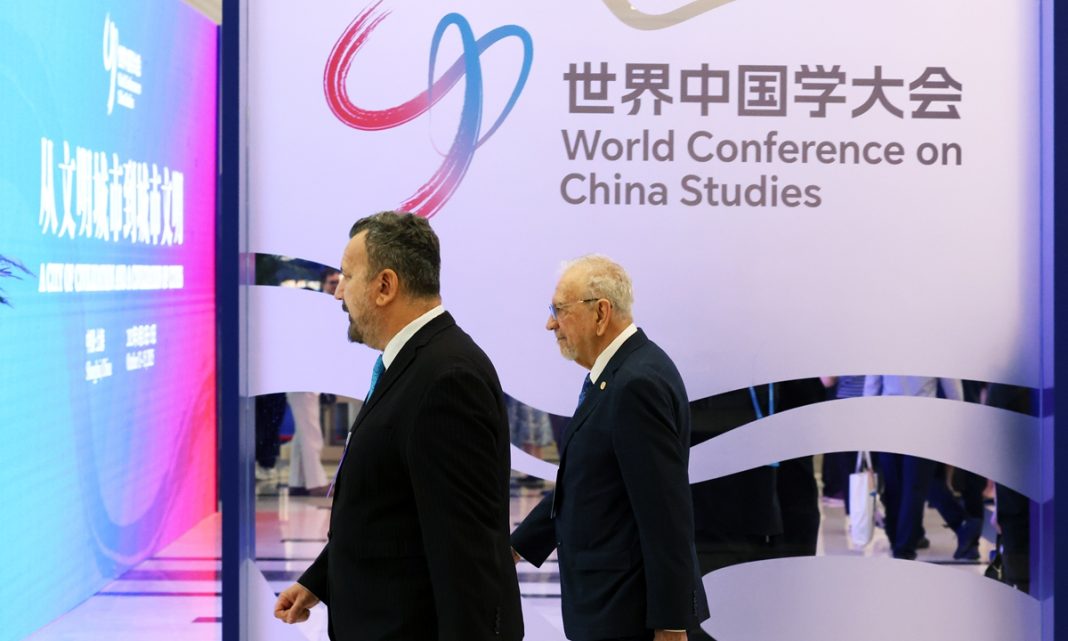BEIJING: The second World Conference on China Studies kicked off in East China’s Shanghai on Tuesday, where some 500 experts and scholars from around the world have engaged in in-depth discussions on the theme “Historical and Contemporary China: A Global Perspective.”
Li Shulei, a member of the Political Bureau of the Communist Party of China (CPC) Central Committee and head of the Publicity Department of the CPC Central Committee, attended the opening ceremony and delivered a keynote speech.
Domestic and foreign guests noted that President Xi Jinping sent a congratulatory letter in 2023 to the inaugural edition of the conference, pointing out that “China Studies are not only the studies of historical China, but also the studies of contemporary China,” which provided important guidance for promoting academic exchanges and cultural dialogue between China and other countries.
Currently, the world is undergoing major changes unseen in a century at an accelerated pace and human society is once again at a critical crossroads. The international community is paying increasing attention to China. It is necessary to uphold a global perspective, ground efforts in China’s practice, continuously improve the knowledge system of China Studies, conduct in-depth academic interpretation of China, and better contribute to the world with Chinese wisdom and concepts, according to conference participants.
Guests noted that China Studies should understand Chinese civilization as an integrated and unified dynamic entity, and grasp the full picture of China’s economic, political and social development within a broader historical and cultural context.
China Studies should conduct in-depth explanations of the path of Chinese modernization to tell the world a true, multi-dimensional and comprehensive story of China. It should practice the Global Civilization Initiative, act as an envoy for connecting Chinese and foreign civilizations, and play a greater role in promoting exchanges and mutual learning among civilizations, they said.
At the opening ceremony, Romano Prodi, former Prime Minister of Italy and former President of the European Commission, stated in his address that strategic cooperation remains the underlying tenor of China-EU relations and that any form of decoupling would run counter to the fundamental interests of both sides.
The two sides should seek a balance between pragmatism and strategic mutual trust, and only by doing so can China and Europe transcend their differences and jointly forge a stable and prosperous future, Prodi said.
The Shanghai Initiative for Global Mutual Learning and Advancement of China Studies was launched on Tuesday at the conference, outlining the missions for China Studies, which include to examine China’s development from the broad perspective of human civilization, deepen cooperation with an open spirit, and draw on Chinese wisdom to address global challenges.
The expanding significance of China Studies mirrors profound shifts in the international landscape.
Scholars noted that between the first and second conferences, global interest in China’s development model has intensified considerably, driven by accelerating multipolarity and growing recognition that Western approaches do not represent universal solutions.
Richard Sakwa, a professor of European politics at the University of Kent in Canterbury, UK, observed that China’s growing influence amid a relative Western decline has focused unprecedented attention on its development path and global governance vision.
Sakwa told the Global Times that as multipolarity deepens, the world is looking to China for a new type of leadership that differs from hegemony. He cited the China-proposed Global Governance Initiative as a potential framework for reshaping international institutions.
The comparative civilizational perspective has emerged as a distinctive feature of this second conference.
Jan Oberg, founder of the Transnational Foundation for Peace and Future Research in Sweden, told the Global Times that while some Western powers remain trapped in a cycle of military competition, China has channeled resources into improving livelihoods and economic construction, a strategic foresight with profound implications.
Oberg pointed that unlike the Western push for a single political model, China advocates “harmony in diversity” through initiatives like the Belt and Road Initiative and upholding the Five Principles of Peaceful Coexistence, which he really admires.
For scholars from other civilizations with long history, such as India, China’s experience holds special resonance. Indian scholar Avijit Banerjee told the Global Times that China’s achievements in cultural heritage protection and poverty alleviation offer valuable lessons, proving that modernization and cultural roots can thrive together.
The urban landscape of Shanghai itself has provided scholars with tangible evidence of China’s transformative journey.
On Monday evening, against the backdrop of the Huangpu River, scholars from around the world gathered for a cruise tour. On one side stood the Bund’s historic colonial-era buildings, silent witnesses to an era of change while on the other, the towering skyscrapers of Lujiazui pierced the night, symbols of China’s modern transformation. This vivid contrast, between history and modernity, reflects China’s smooth process from the historical to a modern nation. –The Daily Mail-Global Times news exchange item





